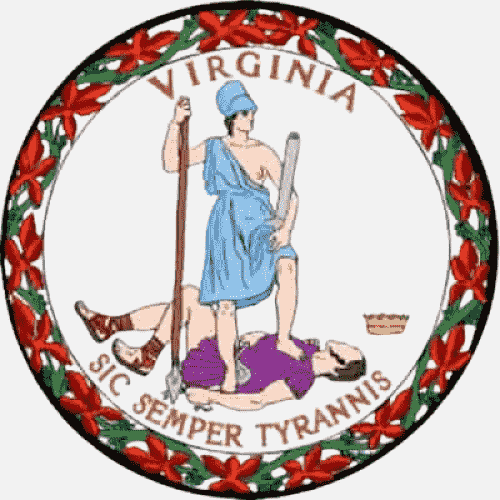 State Flag |  State Seal |
Virginia, officially the Commonwealth of Virginia, is a state located in the South Atlantic region of the United States. Virginia is one of four U.S. states constituted as a commonwealth and is the birthplace of five Presidents; 1st-George Washington, 3rd-Thomas Jefferson, 4th-James Madison, 5th-James Monroe, and 10th-John Tyler.
- ABBREVIATION: VA
- NICKNAME: The Old Dominion State
- POPULATION: 8,811,195 (2024 est.)
- CAPITAL: Richmond
- STATE BIRD: Cardinal
- STATE FLOWER: American Dogwood
- AREA: 42,774 sq. mi.
- TIME ZONE: Eastern
- ENTERED UNION: June 25, 1788
- ALTITUDE: High, 5,729 ft. Mount Rogers
- CLIMATE: Hot summers, short winters with some snow. Moderate rainfall.
The land the English colonists came upon in 1607 stirred feelings of wonder. Green pines stood high by the sea. Cedars looked as impressive as those of Biblical Lebanon. Wild grapes were abundant and the streams pure and cool.
To this day the state retains much of the pristine beauty that led settlers to name the colony in honor of their Virgin Queen, Elizabeth I. The Old Dominion rises slowly from the placid tidewater lowlands by the Atlantic, through the rounded hills of the Piedmont Plateau, to the crowning Blue Ridge Mountains.
In the Shenandoah National Park, which straddles the Blue Ridge, Virginia rejoices in one of America’s natural wonders. From the park’s 105-mile-long-Skyline Drive, visitors can look west toward a horizon that evokes a sense of the wilderness that confronted the pioneers.

Arlington National Cemetery, Arlington County, Virginia
The land remains as prolific as it is beautiful. Here tobacco was first cultivated by white men in North America and once was the state’s largest cash crop, today greenhouse/nursery, and soybeans are more lucrative, with livestock products now generating more than 2/3 of the state’s total agricultural receipts.
Virginia ranks fifth among apple-growing states, and is a major manufacturer of paper, furniture and communication satellites. The Pentagon, the headquarters of the CIA, and seven military bases are all located in Virginia.
Fun Facts:
- In 1989, Virginia voters elected the country’s first African-American governor, Douglas Wilder.
- Arlington County was a portion of the land surveyed in 1791 to be part of the District of Columbia, but the land was returned to Virginia by the U.S. Congress.
- Virginia provided four of the first five presidents of the United States, and eight total (as of 2015).
- Wild ponies have lived on Assateague Island for centuries. The ponies that live on the Virginia end of the island are owned by the Chincoteague Volunteer Fire Department. Each year in a roundup, young ponies swim to Chincoteague where they are auctioned off as a fund-raising event.
- Over 2,200 of the 4,000 battles in the Civil War were fought in Virginia.
- The College of William and Mary in Williamsburg is the second oldest in the United States, it was founded in 1693.
History:
Virginia holds a central place in American history, often referred to as the “Mother of States” and the “Cradle of the Nation.” As the site of the first permanent English settlement in North America, a major battleground during the American Revolution and the Civil War, and the birthplace of numerous U.S. presidents, Virginia’s historical significance is unmatched.
Long before European colonists arrived, the land that is now Virginia was inhabited by various Native American tribes, most notably the Powhatan Confederacy. These Indigenous peoples developed complex societies and economies based on farming, fishing, and trade. Their culture and land would be profoundly disrupted by colonization.
In 1607, English settlers established Jamestown on the banks of the James River, making it the first permanent English settlement in North America. Sponsored by the Virginia Company of London, Jamestown faced severe hardship in its early years, including disease, starvation, and conflict with Native peoples.
However, the colony eventually stabilized, particularly with the introduction of tobacco as a cash crop by John Rolfe. Tobacco farming became the foundation of Virginia’s economy and led to the importation of enslaved Africans by 1619, marking the beginning of slavery in English America.
As the colony grew, it developed one of the earliest representative governments in the New World—the Virginia House of Burgesses, established in 1619. This laid the groundwork for American democracy. By the 18th century, Virginia was the most populous and influential colony, home to wealthy plantation owners and political thinkers.
Virginia played a leading role in the American Revolution. It was the home of key Founding Fathers, including George Washington, Thomas Jefferson, James Madison, and Patrick Henry. Jefferson, a Virginia native, drafted the Declaration of Independence in 1776.
The Revolutionary War concluded in Virginia at the Battle of Yorktown in 1781, where British General Cornwallis surrendered to American and French forces.
After independence, Virginia remained politically and culturally influential. It was instrumental in drafting the U.S. Constitution and the Bill of Rights, with James Madison, another Virginian, often called the “Father of the Constitution.” However, the state also remained heavily reliant on slavery and agriculture.
When the Civil War began in 1861, Virginia seceded from the Union and joined the Confederacy. It became a major battleground, with more battles fought on Virginia soil than in any other state. Richmond, the capital of the Confederacy, and the nearby Appomattox Court House, where Confederate General Robert E. Lee surrendered in 1865, bookended the war’s military history.
In the 20th century, Virginia underwent modernization and demographic change, with urbanization and the growth of Northern Virginia due to proximity to Washington, D.C. The state also played a role in the Civil Rights Movement, particularly in the battle over school desegregation.
Today, Virginia is a diverse and dynamic state, balancing its deep historical roots with modern growth. From Jamestown to the White House, Virginia’s story mirrors the evolution of the United States itself, making it one of the most historically significant states in the nation.